News
Aston Bay Announces Additional Shallow Copper Mineralization Intersected at Storm Project, Nunavut
TORONTO, ON, August 8, 2022 – Aston Bay Holdings Ltd. (TSXV: BAY) (OTCQB: ATBHF) ("Aston Bay" or the "Company”) is pleased to announce the excellent visual results confirming the presence of shallow copper mineralization in another four diamond drill holes completed at the Company’s high-grade Storm Copper Project (“Storm” or the “Project”) on Somerset Island, Nunavut. This is the maiden drilling program for American West Metals Limited (“American West”), who are the project operator, since entering an option agreement with Aston Bay in March 2021.
Highlights
- Four additional diamond drill holes completed at the high-grade Storm Copper Project; a total of six diamond drill holes have been completed to date (see news release dated July 25, 2022);
- All intersections of copper sulfides are within 100 metres (m) from surface, indicating a significant volume of shallow mineralization;
- The breadth and intensity of mineralization evidenced in the current Storm drilling campaign have consistently been representative of previous historical drill holes, which yielded 110m* @ 2.45% copper (Cu) from surface (drill hole ST97-08), and 56.3m* @ 3.07% Cu from 12.2m (drill hole ST99-19);
- Latest drill holes have intersected wide intervals of visual copper mineralization, including:
- ST22-03 has intersected 74.6m* of mineralization, including 15.13m* of breccia and massive copper sulfides over multiple intervals;
- ST22-04 has intersected 43.7m* of mineralization including 24.5m* of breccia and massive copper sulfides over multiple intervals;
- ST22-05 has intersected 65m* of mineralization including 25.2m* of breccia and massive copper sulfides over multiple intervals; and
- ST22-06 has intersected 59m* of mineralization including 15m* of breccia and massive copper sulfides over multiple intervals.
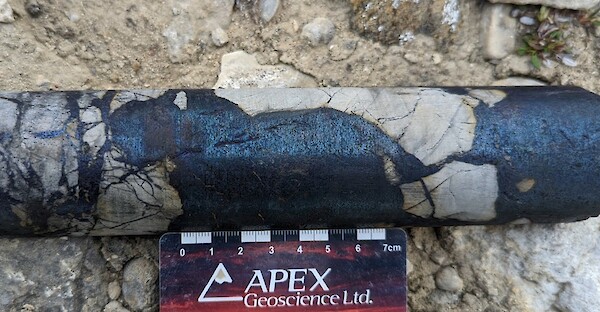
Figure 1: Massive bornite from approximately 50.9m downhole in drill hole ST22-05.
“Drilling at Storm has produced outstanding results in all six holes drilled so far this season,” stated Thomas Ullrich, CEO of Aston Bay. “These significant new results continue to demonstrate the continuity between historical copper intersections at the 2750N Zone, where our partner is working to define a copper resource. Drilling will soon shift to test geophysical anomalies for similar mineralization in other areas as well as targets that may represent feeder zones for the near-surface mineralization.”
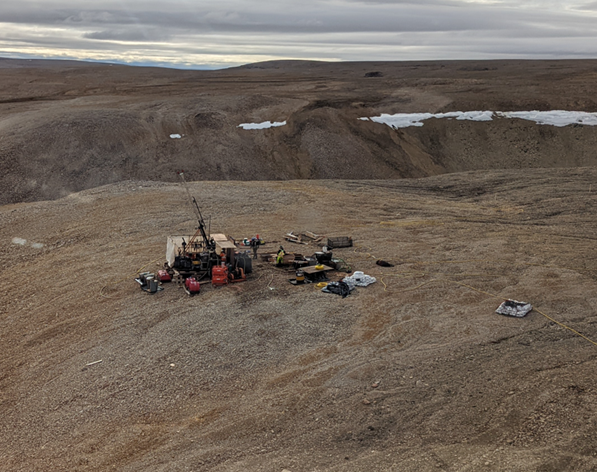
Figure 2: Drilling underway on drill hole ST22-02 at the 2750N Zone, Storm Copper Project. View looking west.
Drill holes ST22-03, ST22-04, ST22-05 and ST22-06 were completed in the 2750N Zone and have all successfully intersected thick zones of breccia and massive sulfides (mostly chalcocite) hosted within much broader intervals of vein- and fracture-style copper mineralization.
A total of 789m of drilling has been completed to date within the shallow and high-grade 2750N Zone; drilling continues to confirm the continuity and thickness of the mineralized system.
Mineralization encountered within the latest drill holes shows similar zonation of the copper bearing minerals with chalcocite being the dominant mineral, and with chalcopyrite, bornite, covellite and minor oxides being present within certain intervals.
The 2750N Zone is the focus of initial resource work to define resources for a potential open-pit direct shipping product (DSP) mining operation. Initial ore sorting test work on mineralization from Storm generated a DSP product grading more than 53% Cu (see news release dated April 11, 2022).
The combination of high-grade and shallow mineralization at Storm provides a potential pathway to a very small footprint, ESG sensitive mining operation scenario with the potential for low initial capital and operating costs.
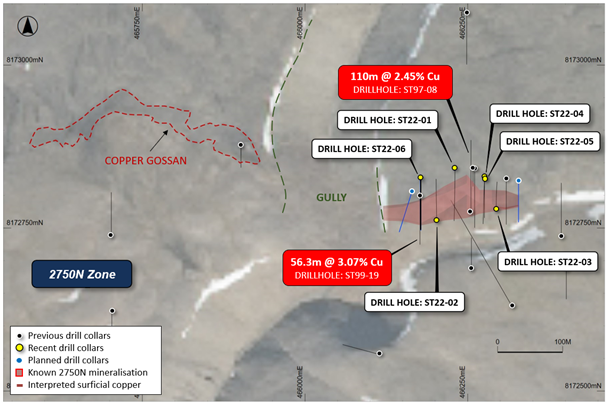
Figure 3: Plan of the 2750N Zone - Drilling, known mineralization and known copper gossans overlaying aerial photography. Note that the 2750N Zone and the gossan to the west are cut by a gully (interpreted fault).
Drill Hole ST22-03
ST22-03 was drilled to a downhole depth of 119m. The drill hole was designed to test the eastern continuity of mineralization between historical drill holes ST99-22 and ST97-08. These two historical drill holes are situated approximately 95m apart (Figure 3).
Table 1 summarizes the mineralization as observed in ST22-03. Intersections are expressed as downhole widths and are interpreted to be close to true widths. Visual estimates of sulfide type, quantity and habit should not be considered a substitute for laboratory assays. Laboratory assays are required to determine the widths and grade of mineralization as reported in preliminary geological logging.
|
Hole ID |
From (m) |
To (m) |
Min |
Description (Sulfide volume within interval) |
|
ST22-03 |
0 |
11.3 |
chpy? |
Veinlets in massive dolomite (1%) |
|
|
11.3 |
12.4 |
chpy/cc/py? |
Massive sulfide breccias (30-40%) |
|
|
12.4 |
14 |
chpy/cc/py? |
Veinlets and local brecciations (5-10%) |
|
|
14 |
29 |
cc/chpy/py/Cu? |
Veinlets and breccias. Localised heavy cemented breccias and native copper (1-2.5%) |
|
|
29 |
47.9 |
cc/chpy/py/Cu? |
Veinlets including red oxide mineral (Cuprite or native copper?)(1%) |
|
|
47.9 |
50.13 |
cc/chpy/cv/ml |
Vugs with red oxide mineral grading to massive sulfides (5- >50%) |
|
|
50.13 |
50.9 |
cc/cv/ml |
Veinlets throughout rock mass (1-2.5%) |
|
|
52.1 |
60 |
ml |
Vugs of malachite within a set of large carbonate veins throughout interval (1%) |
|
|
97.2 |
109.1 |
ml |
Veins and brecciations (1%) |
Table 1: Description of intervals with visually identified mineralization in drill hole ST22-03. Mineralogy key is cc = chalcocite, bn = bornite, chpy = chalcopyrite, py = pyrite, Cu = native copper, ml = malachite, cv = covellite
Drill Holes ST22-04 and ST22-05
ST22-04 and ST22-05 were drilled on the same section to test the vertical continuity of the mineralization in the eastern portion of the system. ST22-04 was drilled to 146m and ST22-05 was drilled to 89m.
Both drill holes have intersected similar geology and mineralization, which provides strong confidence in the continuity of the main zone through this section of the 2750N Zone.
Tables 2 and 3 summarize the geology as observed in ST22-04 and ST22-05. Intersections are expressed as downhole widths and are interpreted to be approximately 75-80% of true width. Visual estimates of sulfide type, quantity and habit should not be considered a substitute for laboratory assays. Laboratory assays are required to determine the widths and grade of mineralization as reported in preliminary geological logging.
|
Hole ID |
From (m) |
To (m) |
Min |
Description (Sulfide volume within interval) |
|
ST22-04 |
27.2 |
28.5 |
chpy/py? |
Massive, fine-grained sulfides grading to laminated massive sulfides (>50%) |
|
|
28.5 |
31 |
cc |
Local breccia with chalcocite and calcite cement (1-2%) |
|
|
31 |
38 |
cc/chpy |
Local breccia and veinlets (1%) |
|
|
38.5 |
40.5 |
cc/chpy |
Brecciated dolomite with local veinlets (2-5%) |
|
|
43.6 |
45.3 |
chpy |
Trace veinlets along fractures (1%) |
|
|
45.3 |
51 |
chpy/cc/py? |
Massive sulfides (>40%) |
|
|
51 |
54 |
cc |
Local breccias and zone of rubble, broken down breccia (1%) |
|
|
54 |
63 |
chpy |
Sulfide veins throughout grading to massive beds of chalcocite downhole (5-10%) |
|
|
69.5 |
75 |
chpy |
Veined and brecciated with sulfide matrix (1-2%) |
|
|
79 |
85 |
cc/Cu/ ml |
Increasing abundance of sulfides within veins and fractures (2-5%) |
Table 2: Description of intervals with visually identified mineralization in drill hole ST22-04. Mineralogy key is cc = chalcocite, bn = bornite, chpy = chalcopyrite, py = pyrite, Cu = native copper, az = azurite, ml = malachite, cv = covellite
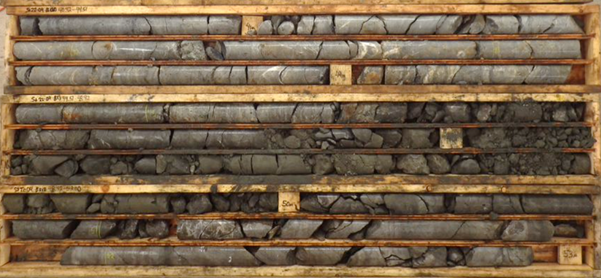
Figure 4: Drill core from ST22-04 between 40.32m to 53m downhole.
|
Hole ID |
From (m) |
To (m) |
Min |
Description (Sulfide volume within interval) |
|
ST22-05 |
24 |
37.8 |
cc/chpy |
Veined and cemented brecciated with sulfide matrix (1-2%) |
|
|
37.8 |
42.5 |
cc/chpy |
Massive sulfides grading downwards to intensive veins and brecciation (5-40%) |
|
|
42.5 |
48 |
cc/chpy/py? |
Rubble with vein sulfide mineralization (1-2%) |
|
|
48 |
53 |
bn/chpy/cv |
Massive sulfides and zones with large and abundant sulfide veins (50%) |
|
|
53 |
54 |
bn/chpy |
Sulfides along fractures (1-2%) |
|
|
54 |
65 |
chpy |
Strongly fractured and veined (5-10%) |
|
|
65 |
74 |
cc/chpy |
Occasional fractures and vein of sulfides (1%) |
|
|
74 |
78.5 |
cc |
Cemented sulfide breccia (5-10%) |
|
|
78.5 |
82 |
cc |
Localised breccias and fractures (1%) |
Table 3: Description of intervals with visually identified mineralization in drill hole ST22-05. Mineralogy key is cc = chalcocite, bn = bornite, chpy = chalcopyrite, py = pyrite, Cu = native copper, az = azurite, ml = malachite, cv = covellite
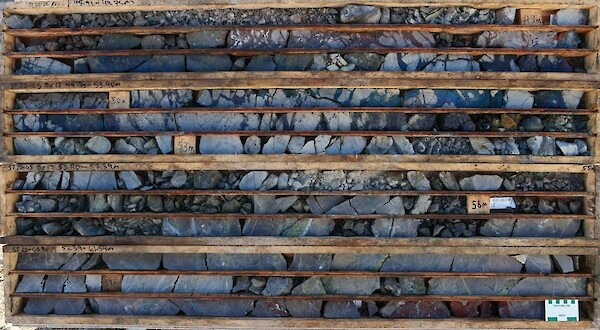
Figure 5: Massive and fracture-fill chalcocite, bornite and chalcopyrite from approximately 45.9m to 61.5m downhole in drill hole ST22-05.
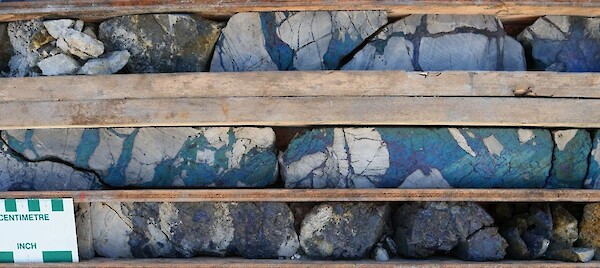
Figure 6: Close-up of massive and fracture-fill bornite and chalcocite from approximately 50m downhole in drill hole ST22-05.
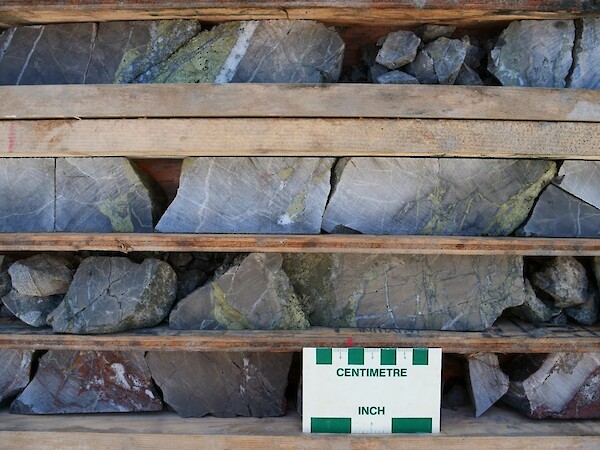
Figure 7: Close-up of chalcopyrite of veins and fracture-fill from approximately 59m downhole in drill hole ST22-05.
Drill Hole ST22-06
ST22-06 was drilled to a downhole depth of 152m. The drill hole was designed to test the continuity of mineralization below historical drill hole ST99-19, which encountered 56m* @ 3.07% Cu from 12.2m.
Drill hole ST22-06 intersected visually similar geology and copper mineralization to ST99-19, with mineralization starting from 21.4m downhole. The drill hole encountered a central zone of massive and brecciated sulfides within a broad interval of vein style, chalcocite dominant mineralization. This drill hole confirms the continuity of the mineralization at depth in the western part of the thick, structurally controlled mineral system.
The 2750N Zone remains open to the west of drill holes ST99-19 and ST22-06 and this area is currently being drill tested. To the west of the 2750N Zone is a large gully (Figures 2 and 3), and this may have been formed by a N-S fault orientated perpendicular to the main strike of the mineralization. Importantly, extensive copper has been identified in outcrop across the gully to the west, which suggests that the mineralization may continue for some distance along the strike of the 2750N Zone.
Table 4 summarizes the mineralization as observed in ST22-06. Intersections are expressed as downhole widths and are interpreted to be close to true widths. Visual estimates of sulfide type, quantity and habit should not be considered a substitute for laboratory assays. Laboratory assays are required to determine the widths and grade of mineralization as reported in preliminary geological logging.
|
Hole ID |
From (m) |
To (m) |
Min |
Description (Sulfide volume within interval) |
|
ST22-06 |
21.4 |
23.8 |
chpy |
Small chalcopyrite veins cross cutting breccias (1%) |
|
|
36.4 |
57.5 |
chpy/py |
Broad zone of veinlets within fractured dolomite (1%) |
|
|
70 |
76 |
cc/py |
Massive and strongly mineralised grading downwards to vein style mineralization (2.5-40%) |
|
|
80 |
96.5 |
cc/py |
Veinlets within fractured dolomite (1-2.5%) |
|
|
96.5 |
105.5 |
cc/py |
Veinlets and brecciated (2.5%) |
|
|
105.9 |
109.5 |
cc |
Brecciated dolomite with chalcocite within calcite veining |
Table 4: Description of intervals with visually identified mineralization in drill hole ST22-06. Mineralogy key is cc = chalcocite, bn = bornite, chpy= chalcopyrite, py = pyrite, Cu = native copper, az = azurite, ml = malachite, cv = covellite
Drilling Program Summary
Figure 3 and Table 5 show details for drill holes completed at the 2750N Zone in the current program. The drill holes are part of the extensional and resource definition drilling for the 2750N Zone where historical drilling has encountered significant copper mineralization, including 110m* @ 2.45% Cu from surface (drill hole ST97-08), and 56.3m* @ 3.07% Cu from 12.2m (drill hole ST99-19).
Significantly, the 2750N Zone copper mineralization remains open at depth and along strike with potential for ongoing drilling to further expand the significant volume of mineralization in this area.
|
Hole ID |
Prospect |
Easting |
Northing |
Depth (m) |
Azi |
Dip |
|
ST22-01 |
2750N |
466230 |
8172841 |
128 |
180 |
-50 |
|
ST22-02 |
2750N |
466202 |
8172763 |
155 |
360 |
-65 |
|
ST22-03 |
2750N |
466293 |
8172778 |
119 |
359 |
-68.6 |
|
ST22-04 |
2750N |
466276 |
8172827 |
146 |
182 |
-60.3 |
|
ST22-05 |
2750N |
466275 |
8172827 |
89 |
180 |
-45.8 |
|
ST22-06 |
2750N |
466177 |
8172827 |
152 |
180 |
-53 |
Table 5: Drill hole details.
About the Storm Copper and Seal Zinc-Silver Projects, Nunavut
The Nunavut property consists of 117 contiguous mining claims and six prospecting permits covering an area of approximately 302,725 hectares on Somerset Island, Nunavut, Canada. The Storm Project comprises both the Storm Copper Project, a high-grade sediment hosted copper discovery (intersections including 110m* @ 2.45% Cu from surface and 56.3m* @ 3.07% Cu from 12.2m) as well as the Seal Zinc Deposit (intersections including 14.4m* @ 10.58% Zn, 28.7g/t Ag from 51.8m and 22.3m* @ 23% Zn, 5.1g/t Ag from 101.5m). Additionally, there are numerous underexplored targets within the 120-kilometre strike length of the mineralized trend, including the Tornado copper prospect where 10 grab samples yielded >1% Cu up to 32% Cu in gossans.
*Stated drillhole intersections are all core length, and true width is expected to be 60% to 95% of core length.
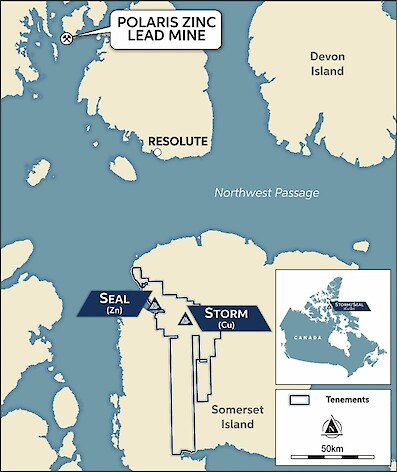
Figure 8: Storm Copper Project, Location Map.
Qualified Person
Michael Dufresne, M.Sc., P.Geol., P.Geo., is a qualified person as defined by National Instrument 43-101 and has reviewed and approved the scientific and technical information in this press release.
About Aston Bay Holdings
Aston Bay is a publicly traded mineral exploration company exploring for base metals and gold deposits in Virginia, USA, and Nunavut, Canada. The Company is led by CEO Thomas Ullrich with exploration in Virginia directed by the Company's advisor, Don Taylor, the 2018 Thayer Lindsley Award winner for his discovery of the Taylor Pb-Zn-Ag Deposit in Arizona. The Company is currently drilling the Mountain Base Metals Project in Virginia, exploring the Buckingham Gold Project, also in Virginia, and is in advanced stages of negotiation on other lands in the area.
The Company is also 100% owner of the Storm Project property, which hosts the Storm Copper Project and the Seal Zinc Deposit and has been optioned to American West Metals Limited.
About American West Metals Limited
AMERICAN WEST METALS LIMITED (ASX: AW1) is an Australian company focused on growth through the discovery and development of major base metal mineral deposits in Tier 1 jurisdictions of North America.
They are a progressive mining company focused on developing mines that have a low-footprint and support the global energy transformation.
Their portfolio of copper and zinc projects include significant existing mineral resource inventories and high-grade mineralization that can generate robust mining proposals. The company is commitment to the ethical extraction and processing of minerals and making a meaningful contribution to the communities where our projects are located.
The company is led by a highly experienced leadership team, with strategic initiatives that lay the foundation for a sustainable business which aims to deliver high-multiplier returns on shareholder investment and economic benefits to all stakeholders.
For further information on American West, visit: www.americanwestmetals.com.
FORWARD-LOOKING STATEMENTS
Statements made in this news release, including those regarding the Option Agreement, grant of the Option and the expected closing date, American West’s interest in the Storm Project and its other acquisitions and plans, plans for the upcoming field season, management objectives, forecasts, estimates, expectations, or predictions of the future may constitute “forward-looking statement”, which can be identified by the use of conditional or future tenses or by the use of such verbs as “believe”, “expect”, “may”, “will”, “should”, “estimate”, “anticipate”, “project”, “plan”, and words of similar import, including variations thereof and negative forms. This press release contains forward-looking statements that reflect, as of the date of this press release, Aston Bay’s expectations, estimates and projections about its operations, the mining industry and the economic environment in which it operates. Statements in this press release that are not supported by historical fact are forward-looking statements, meaning they involve risk, uncertainty and other factors that could cause actual results to differ materially from those expressed or implied by such forward-looking statements. Although Aston Bay believes that the assumptions inherent in the forward-looking statements are reasonable, undue reliance should not be placed on these statements, which apply only at the time of writing of this press release. Aston Bay disclaims any intention or obligation to update or revise any forward-looking statement, whether as a result of new information, future events or otherwise, except to the extent required by securities legislation.